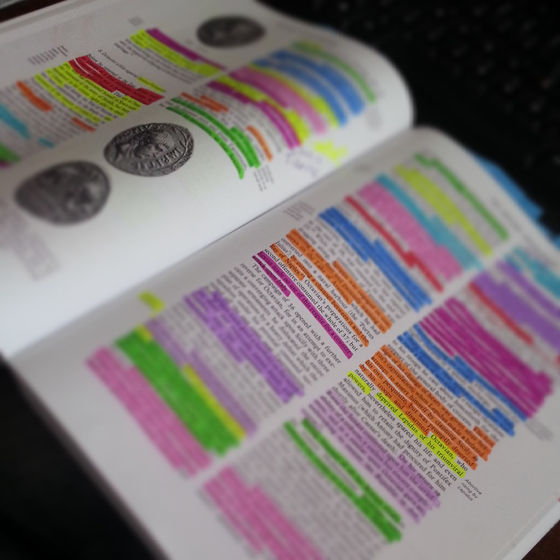Five 'Efficient Study Methods' Explained by Psychologists

There are many opportunities for learning and studying, whether students or working adults, such as studying for exams or obtaining qualifications, but inefficient study methods will not produce results. Paul Penn, a psychology professor at the University of East London, discussed how to study efficiently.
How to study effectively | Psyche Guides
◆ 1: Study diligently
According to Mr. Penn, it is more effective to study diligently by distributing the study time, rather than cramming the contents of the textbook by immersing it overnight. This effect is called the ' spacing effect'.

From the point of view of the spacing effect, for example, even if you study for 12 hours, it is better to study for 2 hours 6 times than to study for 12 hours in a row. In addition, although the longer the sense of studying and studying, the easier it is for the content to take root, but in many cases it is necessary to study for a limited period of time, such as studying for exams. You should prioritize the number of times. Too few times are more likely to be a problem than too many times. '
◆ 2: Try to study similar contents alternately
In many cases, when studying, the content of study is divided into categories by subject or theme, and when one category is over, it moves to the next category. However, recently, it seems that a study method called
For example, a person who wants to learn drug psychology wants to study drugs such as 'stimulants,' 'depressants,' and 'hallucinogens.' In the conventional learning method of dividing by category, first study 'stimulants' and then 'depressants', and so on, by studying by drug category. On the other hand, in the interleaving recommended by Mr. Penn, first the definitions of 'stimulants', 'depressants' and 'hallucinogens' are examined in order, and then the mechanism of action of 'stimulants', 'depressants' and 'hallucinogens' is explained. We will study in a cross-cutting manner, like learning.

According to Mr. Penn, whether the study method divided into categories or interleaving is more effective depends on the content of the study. Interleaving is great when you want to look for 'differences,' for example, when learning about similar themes. On the other hand, the study method of dividing by category is suitable for finding 'similarity', so it seems to be effective when learning what is clearly distinguished from the beginning.
◆ 3: Acquire your own understanding, not reproduce the understanding of others
According to Mr. Penn, the principle of human memory is not 'reproduction' but 'reconstruction'. Therefore, simply reading the teaching materials and reproducing the author's understanding will not fix the study content. On the other hand, if you have a question while reading the teaching materials and answer it in your own words, you will be able to effectively acquire the content.
As a concrete method, first make a question that requires as specific an answer as possible while reading the teaching material, find the answer in the teaching material, and answer it in your own words. The point of this learning method is to repeat this process and finally aim to be able to answer questions without looking at the teaching materials.

◆ 4: Incorporate the practice of remembering into study
Previous studies have shown that remembering information rather than simply outputting it, that is, searching through memory, strengthens memory, and this effect is called the
Regarding the test effect, Mr. Penn commented, 'It's ironic if you hated the test as a nemesis. If you knew the test effect, you could have used the test as a learning tool.'
When incorporating test effects into your studies, use the three steps of 'learning, reciting, and reviewing.' Specifically, you first read a short sentence, then recall it, recite it, and look back to see if it fits. The point here is not to memorize each word so that you don't make a mistake, but to repeat it until you can confirm that you understand the content. You can also make notes that describe your understanding by writing them as sentences instead of reciting them.
◆ 5: Don't just draw a marker, think carefully
The method of highlighting important places with a highlighter is widely used among students. However, according to the survey, the more markers are used, the less the benefits of drawing markers. Penn points out that this isn't about the act of drawing a marker at an important point, but about not thinking about why it's important.

So, 'It's fine to use a highlighter like an optical scanner that sends data into your head, but it's not a substitute for reading textbooks carefully,' he said.
At the end, Mr. Penn said, 'Not only do you have to go to the gym, but you also have to work hard to study so that it doesn't make sense if you don't sweat there. Fortunately, a survey on student grades and learning habits It has been suggested that high-performing students do not necessarily spend a lot of time studying, which means that how they study is more important than how much they devote their lives to studying. That's why, 'he emphasized that the quality of learning is more important than study time.
Related Posts:
in Note, Posted by log1l_ks







